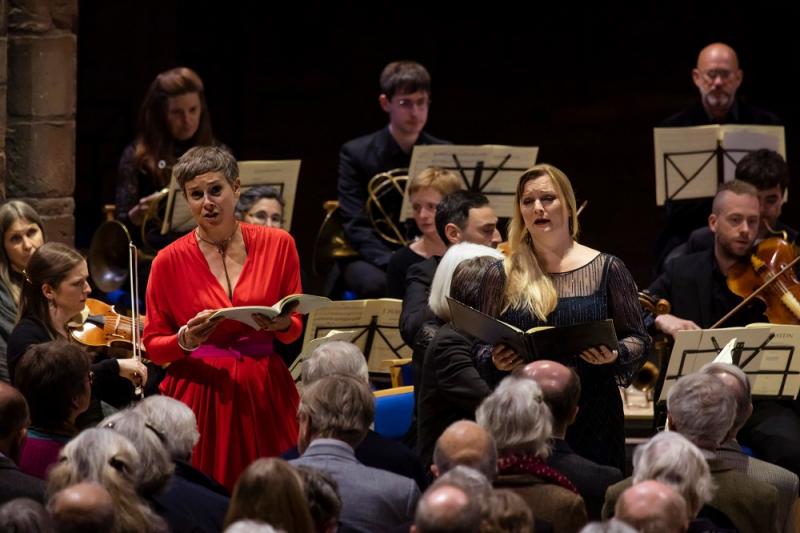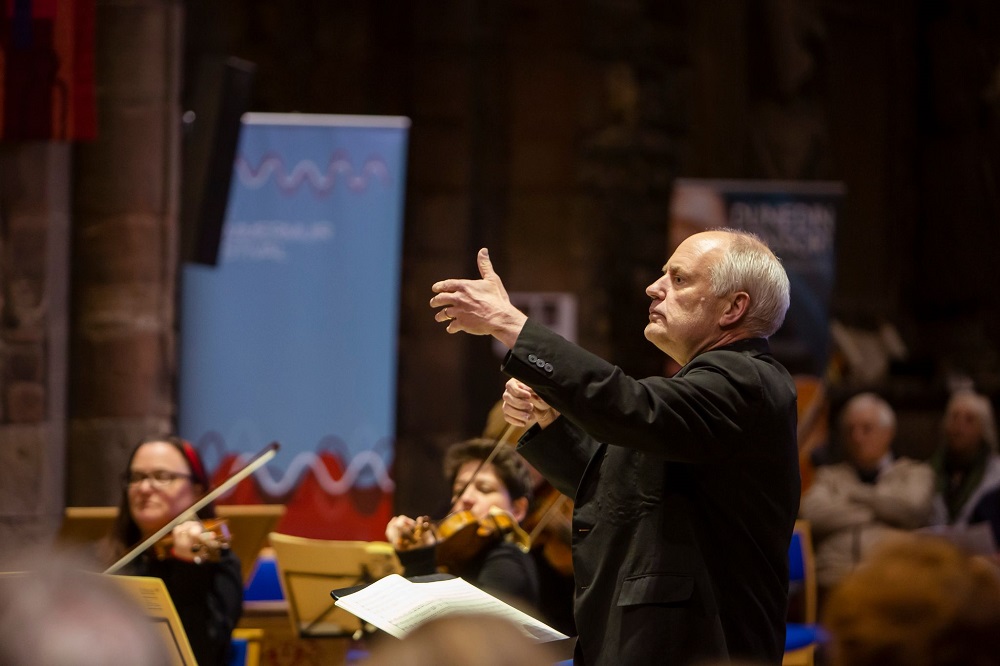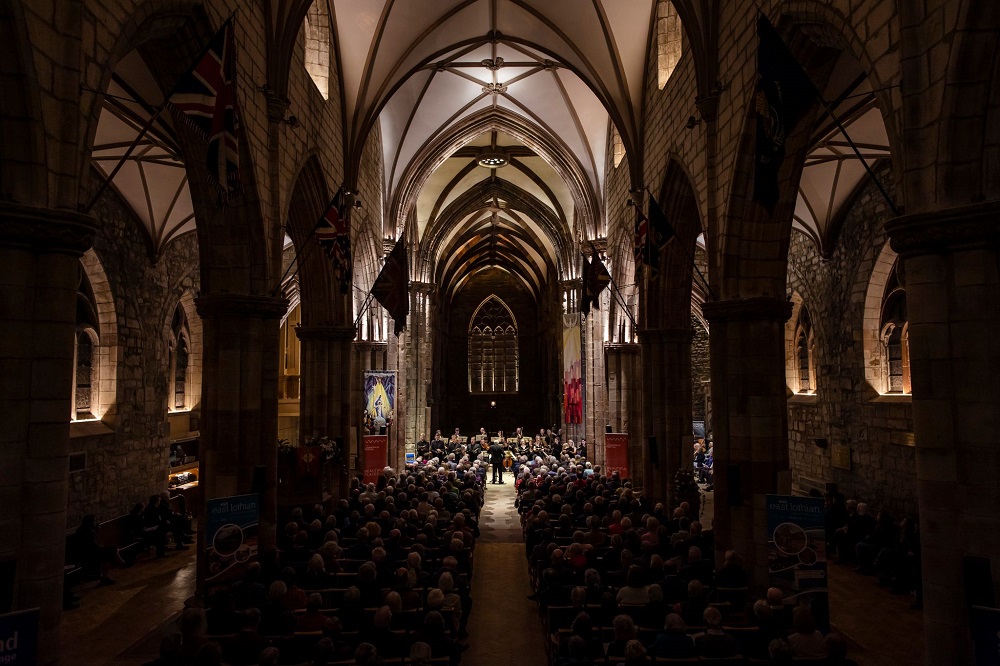Dunedin Consort, Butt, Lammermuir Festival review - majestic Mozart at St Mary’s Haddington | reviews, news & interviews
Dunedin Consort, Butt, Lammermuir Festival review - majestic Mozart at St Mary’s Haddington
Dunedin Consort, Butt, Lammermuir Festival review - majestic Mozart at St Mary’s Haddington
Star sopranos steal the show in a C Minor Mass of magisterial power

The Dunedin Consort are most readily associated with the music of the Baroque, but this concert showed that they’re every bit as good at playing the music of the next generation. At times, in fact, I was taken aback by the magisterial scale of the orchestral sound as they played Mozart’s great C Minor Mass.
There was wiry intensity to the period-instrument strings of the opening of the Kyrie, but this was always a sound of commanding strength, one where hair shirts were left in the cupboard and a sense of scale was allowed to have its impact. Director John Butt used the new edition (Breitkopf) by Clemens Kemme which makes some amendments to the sections that Mozart left unfinished. The most noticeable impact comes at the remarkably punchy opening of the Credo, which positively bristled with trumpets and drums in a way that caught me unawares.  Other changes are less apparent, but the overall impression of the performance was of how magisterial a sound the Dunedin players can make, even with such a small cohort of strings (eleven altogether), sounding terrific in the vaulted splendour of St Mary’s Church, Haddington.
Other changes are less apparent, but the overall impression of the performance was of how magisterial a sound the Dunedin players can make, even with such a small cohort of strings (eleven altogether), sounding terrific in the vaulted splendour of St Mary’s Church, Haddington.
The same could be said of the chorus of only 10 singers who nevertheless created a splendidly full sound. The bass line sounded a little thin, hardly surprising when sopranos outnumber basses two to one, but that was still a bit of a shame. The choristers’ explosive excitement at the start of the Gloria was probably the evening’s highest impact moment, and Butt was happy to reconfigure them in different formations to accentuate on the one hand the neo-Baroque scourgings of the Qui tollis and, on the other, the polychoral conversation of the Osanna. There were occasional lapses of ensemble, but that was largely down to having the singers standing in line with the conductor. No doubt that will be ironed out when, over the next week, this team take this work into the recording studio, with a CD due out next year.  The brightest stars were the soprano soloists, however, and what a luxury to have both Lucy Crowe and Anna Dennis singing in the same work. Both have star quality, but it’s a different kind of magic for each. Crowe’s voice is rich, full and splendid, and she got the two big moments in Christe and Et incarnatus est. Dennis’ is humane, warm and creamy, and she sounded thrilling in Laudamus te. When the two joined forces in Domine Deus the sound was completely extraordinary. When tenor Benjamin Hulett and bass Robert Davies joined them for the Quoniam and Benedictus, they really never stood a chance.
The brightest stars were the soprano soloists, however, and what a luxury to have both Lucy Crowe and Anna Dennis singing in the same work. Both have star quality, but it’s a different kind of magic for each. Crowe’s voice is rich, full and splendid, and she got the two big moments in Christe and Et incarnatus est. Dennis’ is humane, warm and creamy, and she sounded thrilling in Laudamus te. When the two joined forces in Domine Deus the sound was completely extraordinary. When tenor Benjamin Hulett and bass Robert Davies joined them for the Quoniam and Benedictus, they really never stood a chance.
Their choice of companion work was also on the programme in 1785 when Mozart gave the only known performance in Vienna of music from the mass, rearranged as his oratorio Davide penitente. Haydn’s symphony was every bit as colourful, with lovely warm string tone at the start of the slow movement and generally gorgeous winds that twittered repeatedly with ear-tickling delight.
rating
Explore topics
Share this article
Add comment
The future of Arts Journalism
You can stop theartsdesk.com closing!
We urgently need financing to survive. Our fundraising drive has thus far raised £49,000 but we need to reach £100,000 or we will be forced to close. Please contribute here: https://gofund.me/c3f6033d
And if you can forward this information to anyone who might assist, we’d be grateful.

Subscribe to theartsdesk.com
Thank you for continuing to read our work on theartsdesk.com. For unlimited access to every article in its entirety, including our archive of more than 15,000 pieces, we're asking for £5 per month or £40 per year. We feel it's a very good deal, and hope you do too.
To take a subscription now simply click here.
And if you're looking for that extra gift for a friend or family member, why not treat them to a theartsdesk.com gift subscription?
more Classical music
 Kilsby, Parkes, Sinfonia of London, Wilson, Barbican review - string things zing and sing in expert hands
British masterpieces for strings plus other-worldly tenor and horn - and a muscular rarity
Kilsby, Parkes, Sinfonia of London, Wilson, Barbican review - string things zing and sing in expert hands
British masterpieces for strings plus other-worldly tenor and horn - and a muscular rarity
 From Historical to Hip-Hop, Classically Black Music Festival, Kings Place review - a cluster of impressive stars for the future
From quasi-Mozartian elegance to the gritty humour of a kitchen inspection
From Historical to Hip-Hop, Classically Black Music Festival, Kings Place review - a cluster of impressive stars for the future
From quasi-Mozartian elegance to the gritty humour of a kitchen inspection
 Shibe, LSO, Adès, Barbican review - gaudy and glorious new music alongside serene Sibelius
Adès’s passion makes persuasive case for the music he loves, both new and old
Shibe, LSO, Adès, Barbican review - gaudy and glorious new music alongside serene Sibelius
Adès’s passion makes persuasive case for the music he loves, both new and old
 Anja Mittermüller, Richard Fu, Wigmore Hall review - a glorious hall debut
The Austrian mezzo shines - at the age of 22
Anja Mittermüller, Richard Fu, Wigmore Hall review - a glorious hall debut
The Austrian mezzo shines - at the age of 22
 First Person: clarinettist Oliver Pashley on the new horizons of The Hermes Experiment's latest album
Compositions by members of this unusual quartet feature for the first time
First Person: clarinettist Oliver Pashley on the new horizons of The Hermes Experiment's latest album
Compositions by members of this unusual quartet feature for the first time
 Gesualdo Passione, Les Arts Florissants, Amala Dior Company, Barbican review - inspired collaboration excavates the music's humanity
At times it was like watching an anarchic religious procession
Gesualdo Passione, Les Arts Florissants, Amala Dior Company, Barbican review - inspired collaboration excavates the music's humanity
At times it was like watching an anarchic religious procession
 Classical CDs: Camels, concrete and cabaret
An influential American composer's 90th birthday box, plus British piano concertos and a father-and-son duo
Classical CDs: Camels, concrete and cabaret
An influential American composer's 90th birthday box, plus British piano concertos and a father-and-son duo
 Cockerham, Manchester Camerata, Sheen, Martin Harris Centre, Manchester review - re-enacting the dawn of modernism
Two UK premieres added to three miniatures from a seminal event of January 1914
Cockerham, Manchester Camerata, Sheen, Martin Harris Centre, Manchester review - re-enacting the dawn of modernism
Two UK premieres added to three miniatures from a seminal event of January 1914
 Kempf, Brno Philharmonic, Davies, Bridgewater Hall, Manchester review - European tradition meets American jazz
Bouncing Czechs enjoy their Gershwin and Brubeck alongside Janáček and Dvořák
Kempf, Brno Philharmonic, Davies, Bridgewater Hall, Manchester review - European tradition meets American jazz
Bouncing Czechs enjoy their Gershwin and Brubeck alongside Janáček and Dvořák
 Solomon, OAE, Butt, QEH review - daft Biblical whitewashing with great choruses
Even a top soprano and mezzo can’t make this Handel paean wholly convincing
Solomon, OAE, Butt, QEH review - daft Biblical whitewashing with great choruses
Even a top soprano and mezzo can’t make this Handel paean wholly convincing
 Two-Piano Gala, Kings Place review - shining constellations
London Piano Festival curators and illustrious friends entertain and enlighten
Two-Piano Gala, Kings Place review - shining constellations
London Piano Festival curators and illustrious friends entertain and enlighten
 Echo Vocal Ensemble, Latto, Union Chapel review - eclectic choral programme garlanded with dance
Beautiful singing at the heart of an imaginative and stylistically varied concert
Echo Vocal Ensemble, Latto, Union Chapel review - eclectic choral programme garlanded with dance
Beautiful singing at the heart of an imaginative and stylistically varied concert

Comments
concert repeated tomorrow